This soft and fluffy gluten-free naan has the perfect chew and softness you expect from traditional naan. It’s easy to make, customizable to be dairy-free, and turns out delicious every time. Whether you’re scooping up curry or making flatbread pizza, this gluten-free naan recipe will become a go-to recipe in your kitchen.
This post may contain affiliate links. Please read our Disclosure Policy.
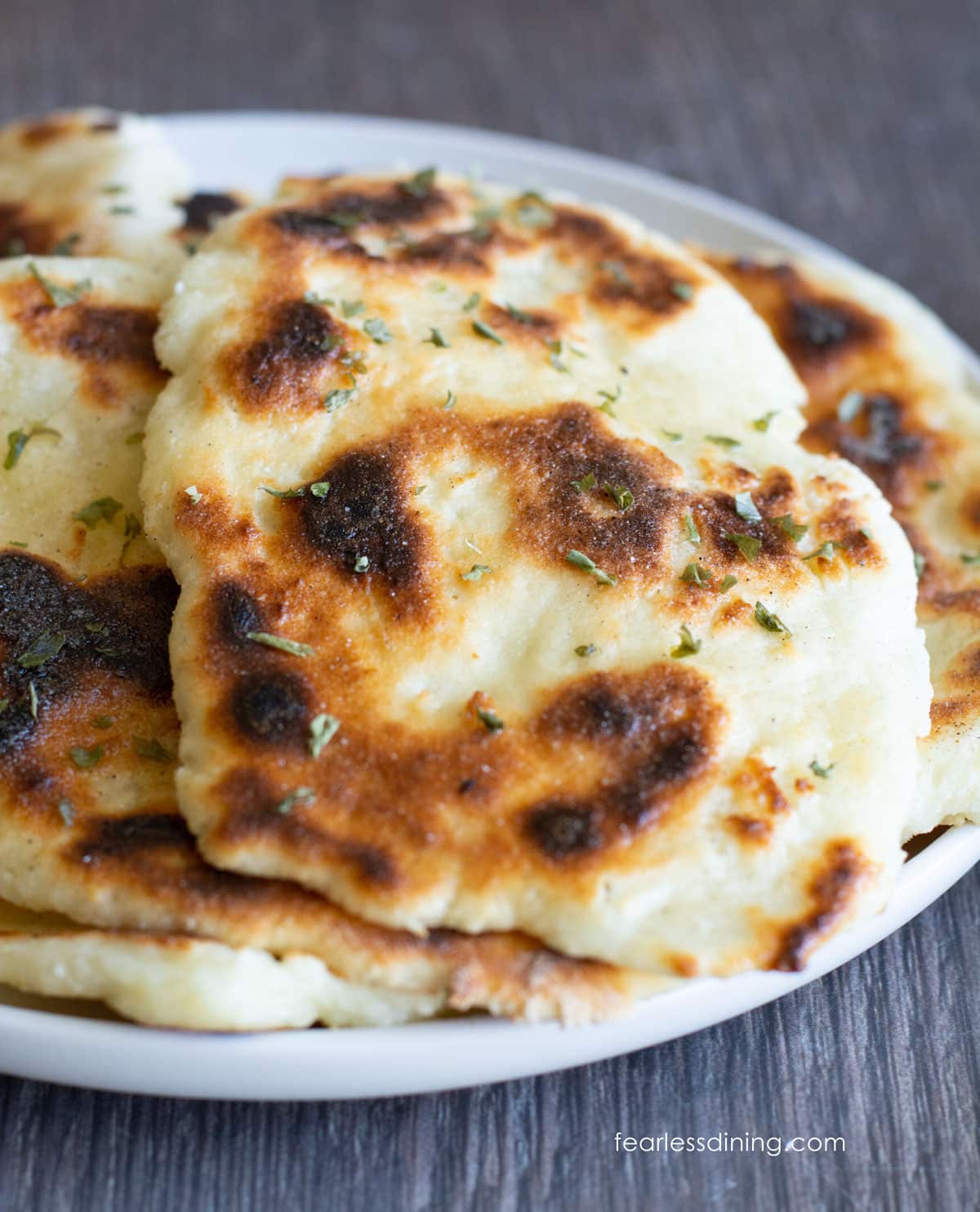
❤️ Sandi’s Summary
1. This gluten-free naan is soft, fluffy, and chewy—just like real naan!
2. Dip this homemade naan in any Indian sauces.
3. Easy to make with simple pantry ingredients.
4. Freezer-friendly: make a batch and reheat when needed.
5. You can use this naan as a pizza crust for flatbread pizza!
[👉 Jump to Recipe]
If you have missed naan bread since going gluten free, I am excited to share my new gluten free naan recipe with you! I tested my recipe with multiple gluten-free flour blends, so you have some choices in which blend to use.
This gluten free naan can be made dairy-free, and one of the flour blends I tested is gum-free, so you can make naan without xanthan gum if you prefer. If you love to make bread, I have a lot of easy gluten free bread recipes to try!
This is THE BEST recipe for GF naan, ever. We make this often in our house! Thank you for tirelessly testing out new recipes and providing so much info for the rest of us. You are truly appreciated!
Katelyn O., Facebook comment
Allergen Information:
This homemade naan is:
- gluten-free
- soy-free
- nut-free
- oat-free
- Make it dairy-free by using dairy-free butter and yogurt.
- Make it gum-free using my DIY gum-free gluten-free flour blend. (See flour blends tested below for the recipe.)
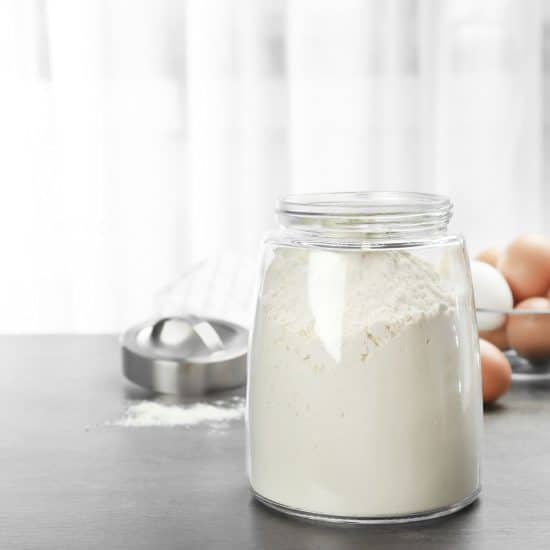
Flour Blends Tested:
- DIY Gluten Free Flour Blend – (gum-free) This flour blend works really well in yeast recipes and tastes delicious.
- Cup4Cup – Note that Cup4Cup recently reformulated the blend with dried milk powder. I haven’t tested this recipe with their new formulation.
- Bob’s Red Mill 1:1 – One reader made this naan with Bob’s blend and said it worked well. NOTE: This blend typically doesn’t work well in yeast recipes.
Ingredient Notes and Swaps:
For the full list of ingredients and amounts, please go to the recipe card below.
- Gluten Free Flour – I tested this recipe with the two blends above. Be sure to use a flour blend that works with yeast. See the Gluten Free Flour Blend and Comparison below for detailed information about these blends.
- Yeast – Most yeast is gluten free, but Red Star Platinum is NOT gluten free! I used Fleischman’s Rapid Yeast to make this naan.
- Yogurt – I used plain Greek Yogurt in my recipe. The yogurt helps give some structure and moisture to the dough. Plain dairy-free yogurt also works.
- Butter – Use salted or unsalted. If you use salted butter, omit the added salt.
- Egg – Use size large.
- Sugar – I used just a tiny bit of sugar to help activate the yeast. Honey will also work to activate the yeast.
- Water – When using yeast, I usually recommend using filtered water. I find that chlorine affects yeast growth negatively in bread recipes.
Please see my Guide to Gluten Free Flour Blends to learn more about gluten free blends that work with yeast recipes.
Tips For Baking Gluten-Free Naan
1. If your dough feels sticky, sprinkle more flour over the dough before rolling.
2. The dough can be made ahead and refrigerated overnight.
3. Cast-iron pans work best for even heat—avoid thin pans that heat unevenly.
How To Make Gluten Free Naan (Step-By-Step)
Note From The Kitchen: The key to great naan is getting the yeast activation just right. I always use warm filtered water (100–110°F) and make sure the dough rises in a cozy spot. Don’t worry if your dough looks sticky—it’s normal for gluten-free dough to need adjusting!
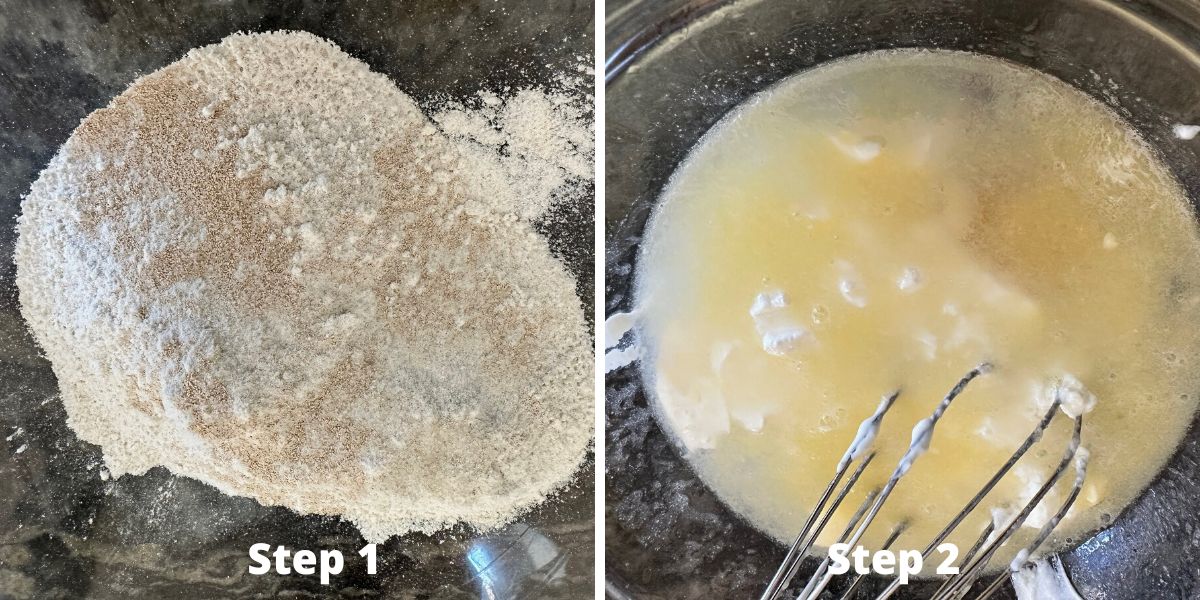
Step 1: Prepare the Dry Ingredients. Add the gluten free flour, salt, and rapid yeast to a large
Step 2: Mix the Wet Ingredients. Add the melted butter, water, yogurt, and egg to a smaller bowl and whisk to blend.
👀 Sandi Says: Ensure the water is warm (between 100-110°F) to activate the yeast properly. If it’s too hot, it can kill the yeast; if it’s too cold, the dough may not rise properly.
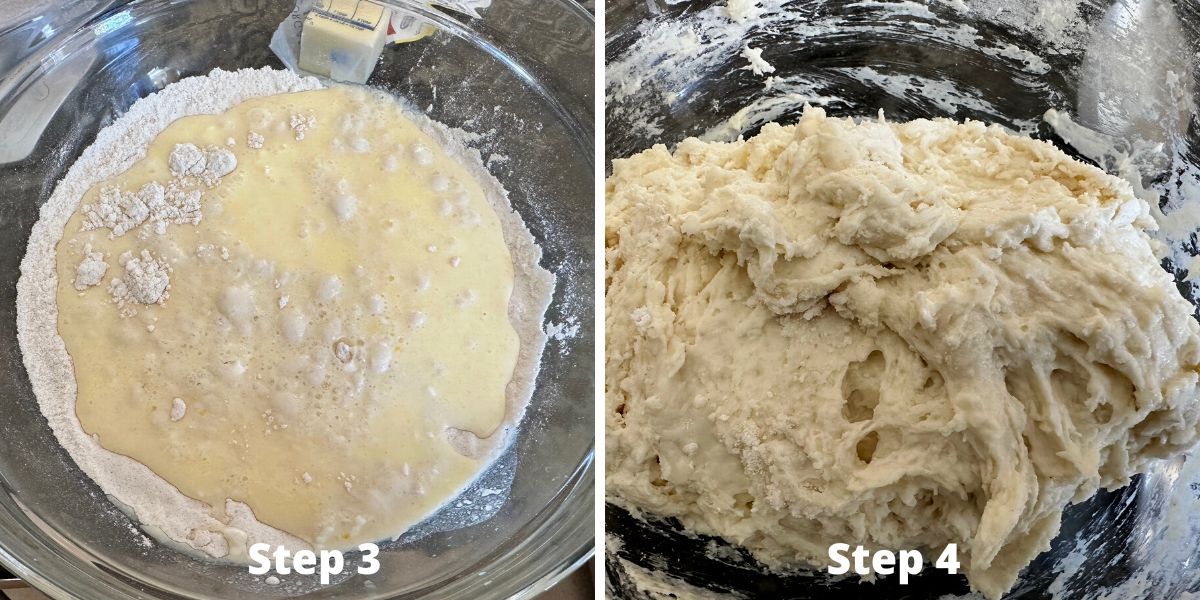
Step 3: Combine the Ingredients. Pour the wet ingredients into the dry ingredients, stirring with a spatula or wooden spoon until a soft, sticky dough forms.
Step 4: Let the Dough Rise. Mix the wet and dry ingredients into the dough. If the dough is too sticky to handle, sprinkle in 1-2 extra tablespoons of gluten-free flour until it is manageable but still slightly tacky.
Cover the mixing bowl with plastic wrap or a clean kitchen towel and let the dough rise in a warm place for 45 minutes to 1 hour. If your kitchen is cold, preheat your oven to 200°F, turn it off, and place the covered bowl inside to create a warm environment for rising.
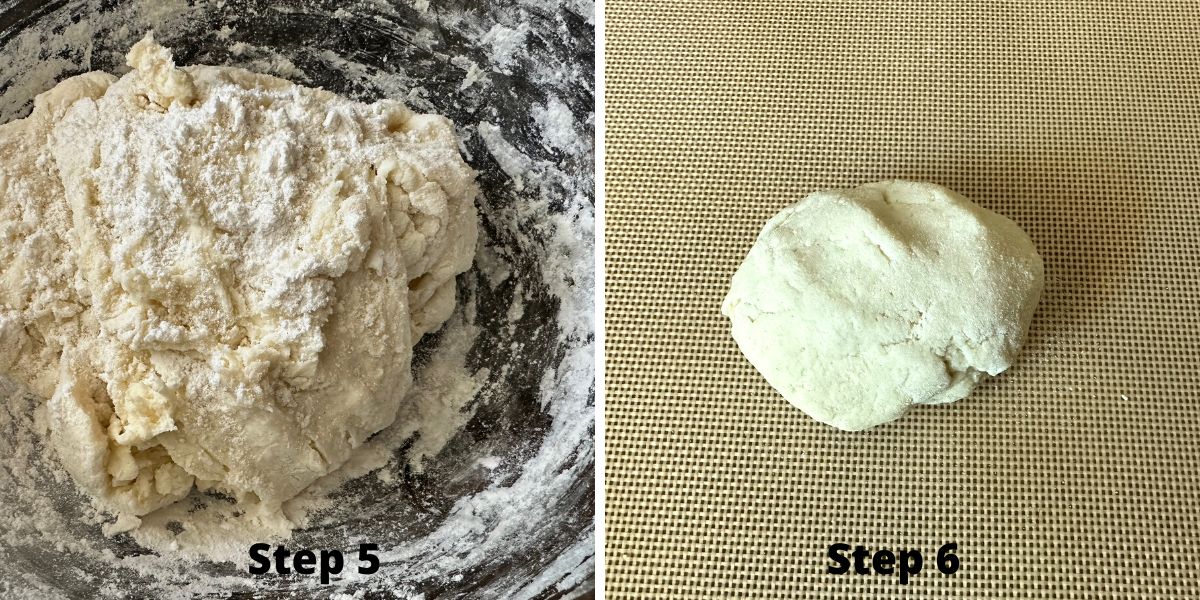
Step 5: Prepare the naan dough for rolling. Remove the plastic wrap and evaluate your dough. If your dough is really sticky, add more flour. If using Cup4Cup flour, you may need to add more flour at this stage if the dough is too sticky to roll out. Lightly dust a clean work surface or a silicone baking mat with gluten-free flour to prevent sticking.
Step 6: Shape the Naan. Divide the dough into 5-6 equal portions, depending on how large you want your naan pieces. Roll each portion into a ball, then flatten slightly with your hands.
Email This Recipe To Me!
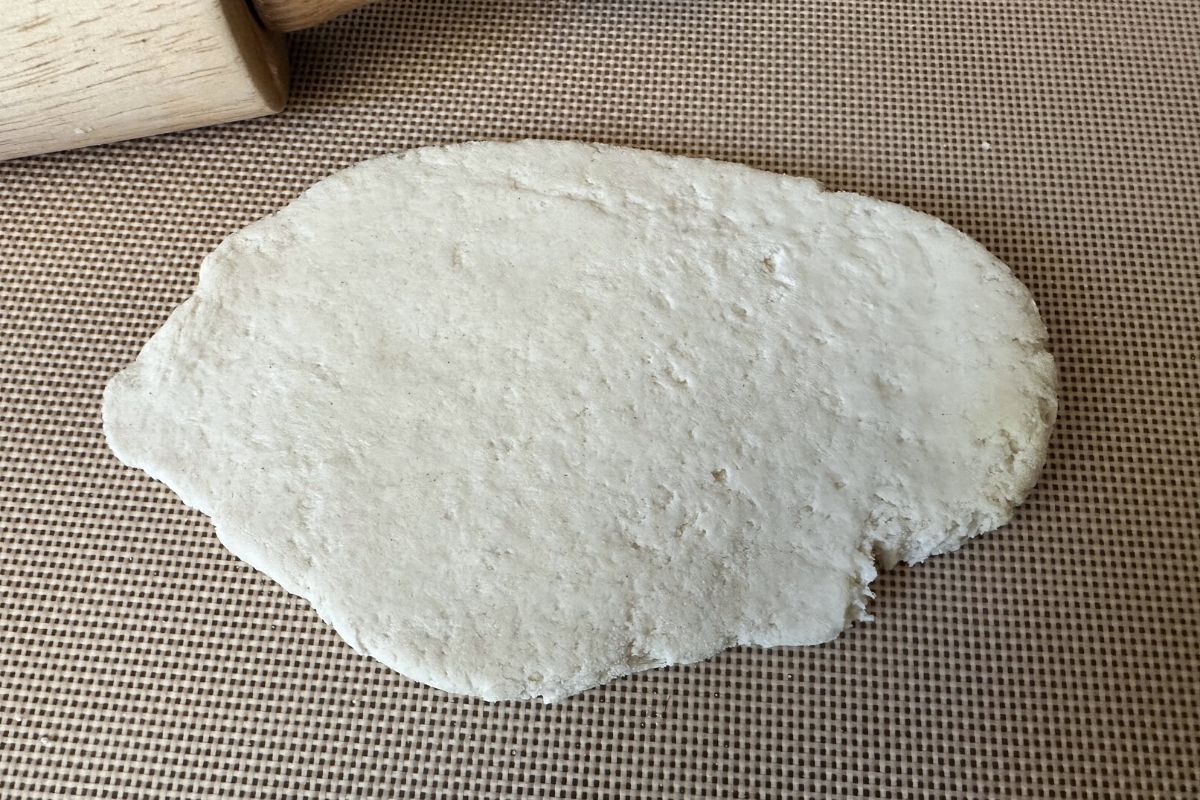
Step 7: Use a rolling pin and roll each dough ball into an oval shape about ¼ inch thick. If the dough sticks to the rolling pin, lightly dust it with flour.
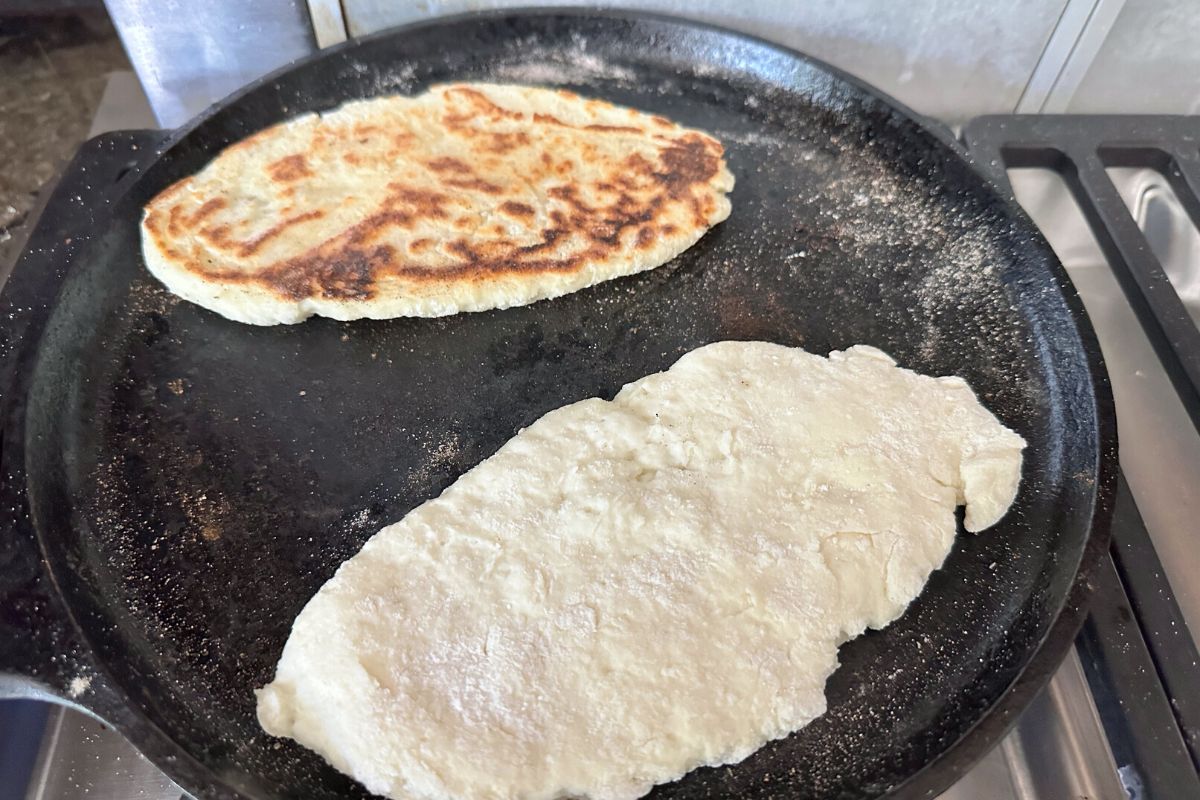
Step 8: Cook the Naan. Heat a cast iron skillet over medium heat. Carefully place a rolled-out naan piece onto the hot skillet and cook for 2-3 minutes, or until bubbles form and the bottom is golden brown. Flip the naan over and cook for another 1-2 minutes.
If the naan isn’t forming charred bubble spots, slightly increase the heat.
Step 9: Transfer the cooked naan to a plate and cover with a clean towel to keep warm while you cook the remaining pieces.
Step 10: Add Flavor & Serve. Melt some butter in a small microwave-safe dish. Melt the butter (or dairy-free butter alternative) in a small microwave-safe bowl. I recommend microwaving it for 20-25 seconds. If desired, mix in minced garlic for extra flavor. Use a pastry brush to brush butter over the naan, then sprinkle a little salt over the tops.
If you’re new to gluten-free bread making, this naan is a great place to start. Don’t worry if your dough looks different—just adjust as needed. If you have questions, drop them in the comments. I love helping you bake with confidence!
Gluten Free Flour Blend Comparison and Notes:
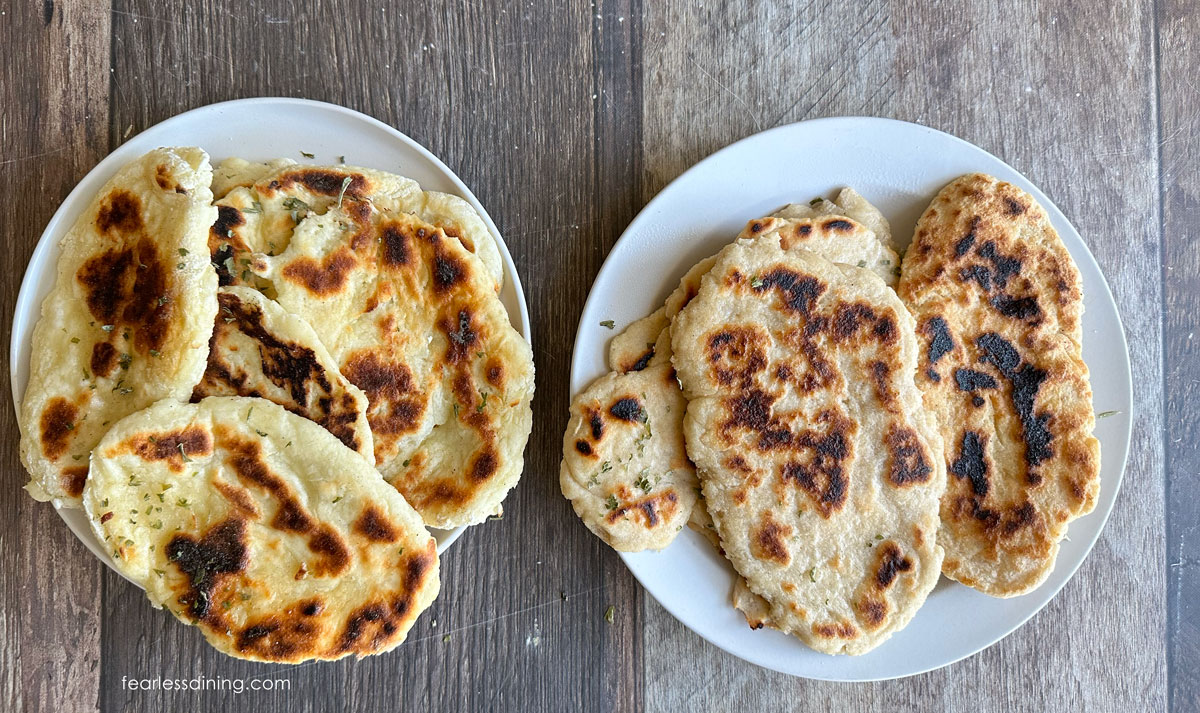
These are side-by-side comparisons of the two gluten free flour blends I tested. The plate on the right is made with my DIY Gluten Free Flour Blend, and the plate on the left is made with Cup4Cup.
Both blends yielded tender, fluffy, soft naan that was flavorful. The main difference seemed to be in the quantity of flour needed in the recipe. 2 1/2 cups of my gluten free flour blend weighed 406.2 grams, and the same amount of Cup4Cup weighed 343.4 grams! That is a significant weight difference!
- Cup4Cup – Light and fluffy texture. This naan is a little more golden due to the milk powder. had to add almost half a cup of additional flour using this blend. Because of this, I reduced the total water amount by 1/4 cup. You must dust the silicone mat and rolling pin in flour when making gluten free naan with Cup4Cup flour.
- My DIY Flour Blend – My blend needed a lot more water than the Cup4Cup, and I think this is because it had less starch, so it uses psyllium husk instead of xanthan gum.
Popular Indian recipes to serve with naan:
- Curry: Naan is often served with a variety of curries, such as Chicken Tikka Masala, Butter Chicken, and vindaloo.
- Kebabs: Grilled kebabs, such as chicken tikka or seekh kebab, pair well with naan.
- Dips and spreads: Naan is great for dipping into sauces and spreads, such as hummus, baba ganoush, roasted eggplant dip, or tzatziki.
- Stews and soups: Naan is a great accompaniment to hearty stews and soups, such as lentil soup or beef stew.
- Chana masala: Chana masala, a popular Indian dish made with chickpeas, is often served with naan.
- Biryanis: an Indian rice dish, is often served with naan.
- Vegetable dishes: Vegetable dishes, such as Instant Pot Saag Paneer, aloo gobi, or baingan bharta, are often served with naan.
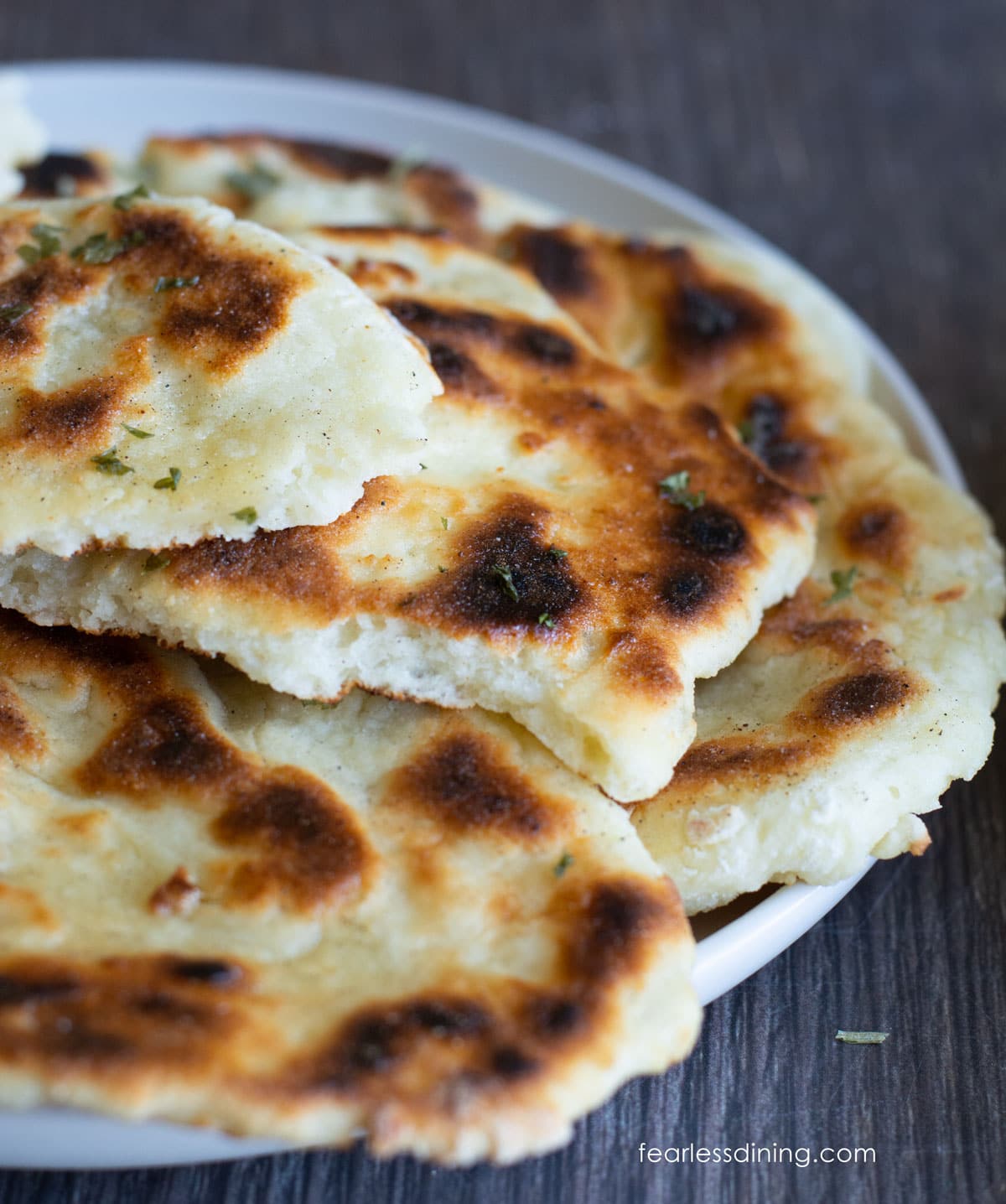
Frequently Asked Questions:
Yes, you can make this naan dairy-free by using plant-based butter and dairy-free plain yogurt.
I have not tested this, but one reader used Just Egg in this recipe, and she said it worked well.
If your naan didn’t rise, there are a few possible reasons. Your yeast could be expired, so check the date. Your water could have had chlorine in it, or the dough may not have had enough time or warmth to rise—try letting it rise in a warm oven.
I haven’t tested the recipe without yogurt, but if you are dairy-free, you can use dairy-free yogurt.
You could bake it, but the texture will be different, and the naan will not have the classic blistering. I haven’t tested baking the naan.
Yes!! This is the best alternative if you do not have a cast-iron skillet. Just place the naan dough directly on clean grill slats. Flip when the dough puffs up or you notice the dough getting too dark.
Storage and Freezing Tips:
Store leftovers in the fridge in an airtight container for up to 3 days. To freeze, place parchment between layers and seal in a freezer-safe bag. Reheat naan in the microwave or a dry skillet for the best texture.
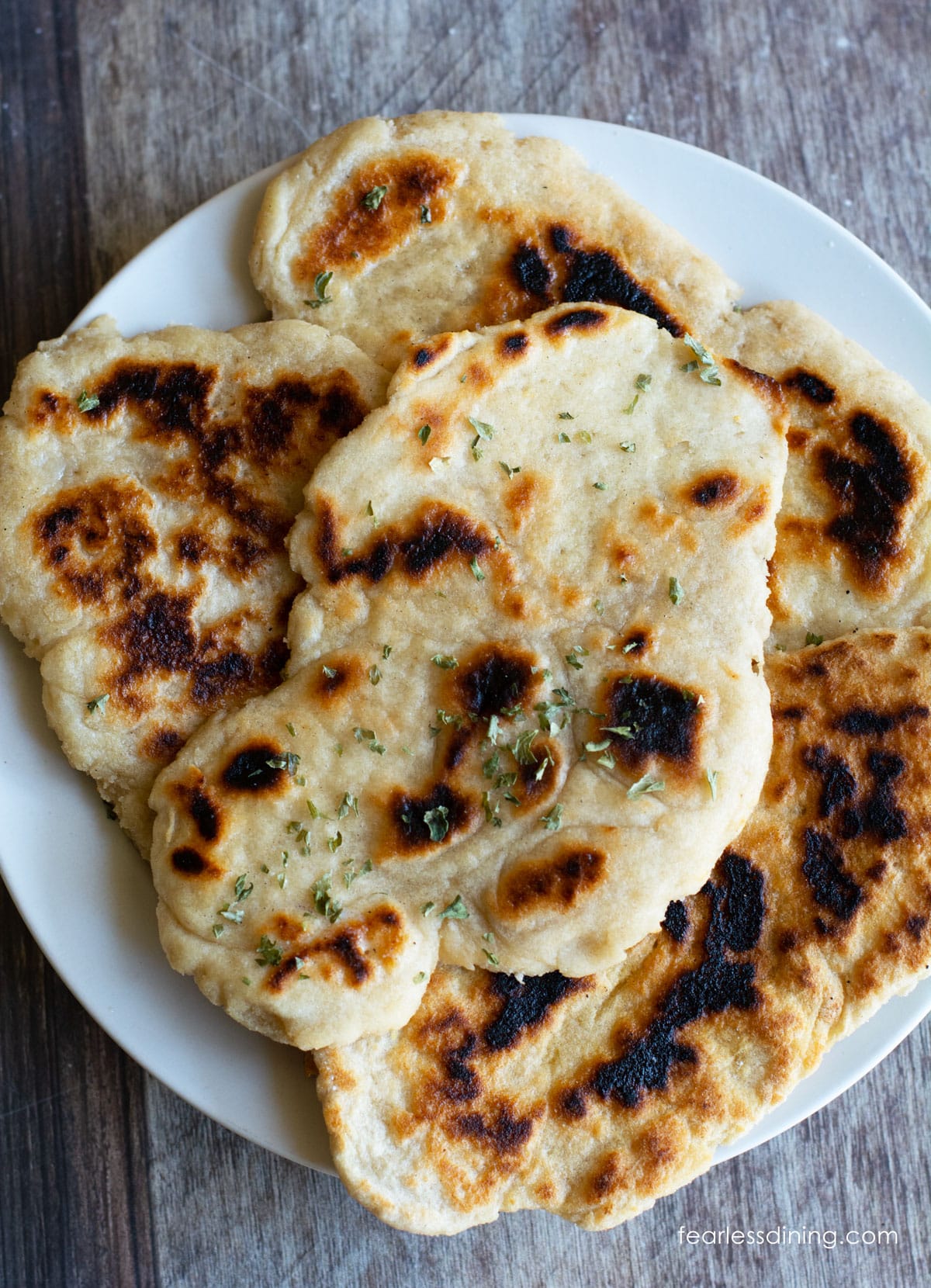
More Gluten Free Bread Recipes:
- Gluten Free Garlic Knots
- Gluten Free Bread Machine Bread Recipe
- Easy Gluten Free Bagels
- Gluten Free Sourdough Bread (sandwich loaf style)
Love This Recipe?
💬 Did you make this recipe? Drop a comment below, and let me know how it turned out! ⭐⭐⭐⭐⭐ Please include which flour blend you used. This will help others know this recipe is delicious. Thank you!
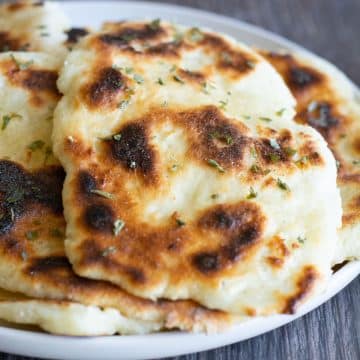
Easy Gluten Free Naan
Equipment
Ingredients
- 2 ¼-2 ½ cups gluten free flour blend See notes!
- 2 ½ teaspoons rapid yeast Do not use Red Star Platinum.
- 1 teaspoon cane sugar
- ½ teaspoon salt
- ¾ to 1 cup purified water *see notes!
- ½ cup plain yogurt
- 2 tablespoons melted unsalted butter
- 1 large egg
Topping
- 3 tablespoons melted butter
- dash salt
- Optional: one clove of minced garlic
Email This Recipe To Me!
Instructions
- Prepare the Dry Ingredients. Add the 2 ¼-2 ½ cups gluten free flour blend, ½ teaspoon salt, 1 teaspoon cane sugar, and 2 ½ teaspoons rapid yeast to a large mixing bowl. Use a whisk to blend them.
- Mix the Wet Ingredients. Add the 2 tablespoons melted unsalted butter, ¾ to 1 cup purified water, ½ cup plain yogurt, and 1 large egg to a smaller bowl and whisk to blend. Make sure the water is warm (between 100-110°F) to activate the yeast properly. If it’s too hot, it can kill the yeast; if it’s too cold, the dough may not rise properly.
- Combine the Ingredients. Pour the wet ingredients into the dry ingredients, stirring with a spatula or wooden spoon until a soft, sticky dough forms.
- Let the Dough Rise. Mix the wet and dry ingredients into the dough. If the dough is too sticky to handle, sprinkle in 1-2 extra tablespoons of gluten-free flour until it is manageable but still slightly tacky.
- Cover the mixing bowl with plastic wrap or a clean kitchen towel and let the dough rise in a warm place for 45 minutes to 1 hour. If your kitchen is cold, preheat your oven to 200°F, turn it off, and place the covered bowl inside to create a warm environment for rising.
- Prepare the naan dough for Rolling. Remove the plastic wrap and evaluate your dough. If your dough is really sticky, add more flour. If using Cup4Cup flour, you may need to add more flour at this stage if the dough is too sticky to roll out. Lightly dust a clean work surface or a silicone baking mat with gluten-free flour to prevent sticking.
- Shape the Naan. Divide the dough into 5-6 equal portions, depending on how large you want your naan pieces. Roll each portion into a ball, then flatten slightly with your hands.
- Use a rolling pin and roll each dough ball into an oval shape about ¼ inch thick. If the dough sticks to the rolling pin, lightly dust it with flour.
- Cook the Naan. Heat a cast iron skillet over medium heat. Carefully place a rolled-out naan piece onto the hot skillet and cook for 2-3 minutes, or until bubbles form and the bottom is golden brown. Flip the naan over and cook for another 1-2 minutes. If the naan isn’t forming charred bubble spots, slightly increase the heat.
- Transfer the cooked naan to a plate and cover with a clean towel to keep warm while you cook the remaining pieces.
- Add Flavor & Serve. In a small microwave-safe bowl, 3 tablespoons of melted butter and a dash of salt. I recommend microwaving it for 20-25 seconds. Optional: one clove of minced garlic for extra flavor. Use a pastry brush to brush butter over the naan, then sprinkle a little salt over the tops.
Notes
- I tested this recipe with Cup4Cup (the old version with dried milk powder) and my homemade gluten free flour blend. See below for important notes on each.
- I recommend using purified water in yeast recipes. Chlorine in tap water can inhibit yeast growth.
- For my DIY GF Flour Blend, start with 2 1/4 cups of flour, and expect you may need more water.
- Cup4Cup – start with 3/4 cup of water and expect to add more flour. My gluten-free flour blend starts with 1 cup of water and is planned to add more water.(Note I have not tested the new formulation in this recipe.)
- Be sure to use plain and not flavored yogurt. You want the tangy flavor of plain yogurt to help flavor your naan.
- To make this recipe dairy-free, use vegan yogurt and butter.
- Store cooked naan in an airtight container in the fridge for up to 3 days, or freeze it in freezer bags.
-
- Cup4Cup – The texture is light and fluffy. This naan is a little more golden, and I think it is because the Cup4Cup has dried milk powder in the blend. This blend was a lot stickier to work with and I had to add almost half a cup of additional flour. Because of this, I reduced the total water amount by 1/4 cup. You will need to dust the silicone mat and rolling pin in flour when making gluten free naan with Cup4Cup flour.
-
- My DIY Flour Blend – My blend needed a lot more water than the Cup4Cup, and I think this is due to the fact it had less starch, so it uses psyllium husk instead of xanthan gum. From a cost perspective, this made it more economical to use this blend because you need less flour. I also did not have to dust my silicone mat when using this blend.
SPECIAL NOTE
Please know that every gluten free flour blend has a different starch to grain ratio. If you use a blend I didn’t test, my rule of thumb is to add more flour if your dough or batter is wet and add more liquid if the dough or batter is too dry!
Nutrition
Nutrition Disclaimer
Nutritional information is an estimate provided to you as a courtesy. You should calculate the actual nutritional information with the products and brands you are using with your preferred nutritional calculator.


I can’t wait to try this recipe! I have difficulty baking with yeast but thanks to your blog I now know the flour blend I use doesn’t work well with yeast. Thank you for all of your insight and recipes!
I am so glad to help build up your confidence. Please reach out if you have any questions.
I don’t have a cast iron pan. Would you suggest a regular frying pan or baking in the oven?
Hi, I would try a regular frying pan. I hope this helps.
I never comment on recipes, but these were hands down the best gf baked item I’ve ever had. No grainy texture or weird after taste. The kids had three each. Will absolutely be making these again!
I am so glad everyone loved the naan…it also makes a great flatbread pizza :-).
I used Steve’s Bread Flour and it came out perfect. It has become my new favorite go to blend for everything.
It really is a magical blend. I am so glad you are enjoying baking with it!
Oh my gosh, Sandi! These came out So Darn Good, thank you 🤗
I am so glad you enjoyed the naan. We have been enjoying it dipped in so many things lately.
Can I use instant yeast in this?
Hi Becky, I haven’t tested instant yeast yet in this recipe. If you try it, please let me know how it turns out.
Any suggestions for egg alternative? My daughter is celiac and ana to eggs 🙁
Hi Jenn, I haven’t tested any egg alternatives, but I would try Just Egg or Bob’s Red Mill Egg Replacer.
I made this a couple of weeks ago it was delicious! I followed the directions exactly and used the tips which made it much easier. I had a question about making the dough in advance and sent a DM not only was it replied to but quickly including my follow up questions. BEST GF SITE I’ve found!!!
I am so glad you loved the recipe, Cyd. I really appreciate your kind words, thank you so much!
You didn’t mention when to add the sugar. I assume it goes in with the yeast?
Hi, yes, the sugar is to help proof the yeast. I can clarify in the recipe.
My son and I made this to go along with tikka masala and it was BOMB. I didn’t even roll them (because I’m lazy). I just patted them out with my hands and they cooked up great. Thank you so much! I have missed naan most of all since becoming GF.
I am so glad you loved the naan! My husband is always asking me to make another batch. Which gluten free flour blend did you use?
We used Bob’s Red Mill cup 4 cup because it was what I had on hand. Making more tonight!
This naan is so good!! I couldn’t believe it was gluten free. Such a perfect side dish!
I wish you would present your recipes with weights for ingredients! You made it clear in your flour comparisons that the weights vary greatly; I prefer to weigh and wish you have that option!
Please see the section titled, “Gluten Free Flour Comparison Notes.” I give measurements there, and how crazy different the weights are between flour blends. How would you propose I list weights when 2 1/2 cups of one flour blend weighs 406.2 grams and another brand weighs 343.3 grams? Given all of the flour blends out there, each with a different weight based on their starch content, having one measurement would cause most people to have fails.